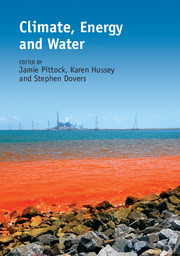Book contents
- Frontmatter
- Contents
- List of contributors
- Acknowledgements
- 1 Justifying, extending and applying “nexus” thinking in the quest for sustainable development
- 2 Water resources, climate change and energy
- 3 Implications of climate change for energy systems in a multisectoral context
- 4 Fossil fuels and water: A complex and evolving relationship
- 5 Renewable energy and water
- 6 Hydropower within the climate, energy and water nexus
- 7 Water and biofuels
- 8 Trade-offs and synergies between water and energy use in rural Australia
- 9 Management of the urban energy-water nexus
- 10 Managing the electricity-water nexus in China, France, India and the United States
- 11 Cross-sectoral governance of the climate, energy and water sectors: A ‘Rubik's cube’ analysis of cross-sectoral co-ordination
- 12 Regulation of the nexus
- 13 Climate, energy and water: the potential roles and limitations of markets
- 14 Strategies to mainstream climate change, energy, water and food security nexus knowledge and skills
- 15 A nexus of nexuses: systemic governance for climate response
- 16 Integrated modelling of the energy-water nexus in the American West
- 17 Biodiversity and the climate, energy and water nexus
- 18 Consumers, food supply chain and the nexus
- 19 Future prospects in climate, energy and water research and policy
- Index
19 - Future prospects in climate, energy and water research and policy
Published online by Cambridge University Press: 05 April 2015
- Frontmatter
- Contents
- List of contributors
- Acknowledgements
- 1 Justifying, extending and applying “nexus” thinking in the quest for sustainable development
- 2 Water resources, climate change and energy
- 3 Implications of climate change for energy systems in a multisectoral context
- 4 Fossil fuels and water: A complex and evolving relationship
- 5 Renewable energy and water
- 6 Hydropower within the climate, energy and water nexus
- 7 Water and biofuels
- 8 Trade-offs and synergies between water and energy use in rural Australia
- 9 Management of the urban energy-water nexus
- 10 Managing the electricity-water nexus in China, France, India and the United States
- 11 Cross-sectoral governance of the climate, energy and water sectors: A ‘Rubik's cube’ analysis of cross-sectoral co-ordination
- 12 Regulation of the nexus
- 13 Climate, energy and water: the potential roles and limitations of markets
- 14 Strategies to mainstream climate change, energy, water and food security nexus knowledge and skills
- 15 A nexus of nexuses: systemic governance for climate response
- 16 Integrated modelling of the energy-water nexus in the American West
- 17 Biodiversity and the climate, energy and water nexus
- 18 Consumers, food supply chain and the nexus
- 19 Future prospects in climate, energy and water research and policy
- Index
Summary
Introduction
Combined, the chapters in this volume present a comprehensive and up-to-date analysis of the interdependencies between the climate, energy and water sectors, and the knock-on consequences of those interdependencies for other issues such as food production and biodiversity conservation. In many respects, the book makes for sobering reading, and it is worth recalling some of the most alarming facts presented by the authors, which stress the enormity and urgency of the challenges ahead.
To recall, the problem
In 2012, the International Energy Agency (IEA) predicted 35 per cent growth in annual global energy demand from 2010 to 2035, and under a forecast scenario that accounts for planned energy-related policies and announced commitments, it estimated global oil, coal and natural gas consumption to expand from 2010 to 2035 by 13 per cent, 21 per cent and 50 per cent, respectively (IEA 2012, cited in Chapter 4). Significantly, even with an anticipated increase in market share for renewable energy (eg seven-fold and twenty-five-fold projected increases in wind and solar photovoltaic generation, respectively), fossil fuels are still expected to satisfy the vast majority of future energy demand (IEA 2012, cited in Chapter 4). If the IEA projections hold true, resulting carbon dioxide emissions would rise by over 20 per cent, corresponding to a long-term average global temperature increase of 3.6 degree Celsius (IEA 2012), ushering in a suite of climate impacts.
Those impacts in turn pose major, near-term risks for energy systems, largely from episodic disruptions due to extreme weather events, especially in particularly vulnerable regions. For both energy supply and energy use, extreme weather events such as hurricanes, tornados, floods, droughts, heat waves and wildfires pose significant threats to sustainable energy services and thus to societies and economies (IPCC 2014). Both electricity demand and electricity supply will be affected by increases in both average and extreme temperatures, as heating requirements reduce and cooling requirements increase.
- Type
- Chapter
- Information
- Climate, Energy and Water , pp. 324 - 336Publisher: Cambridge University PressPrint publication year: 2015
- 1
- Cited by



